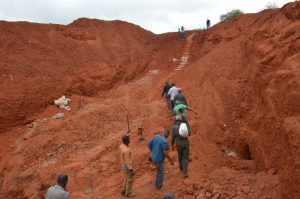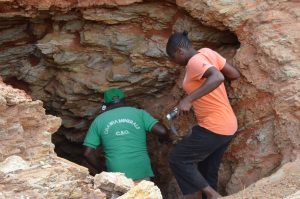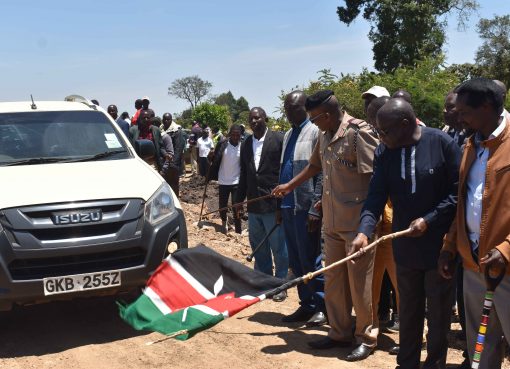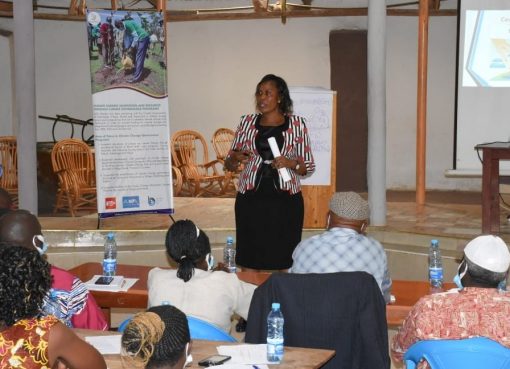To be an artisanal miner in the gemstone fields of Taita-Taveta County, is to live on the edge. Over the years, the promise of great riches hidden beneath these rugged fields has ignited an eternal flame, that burns fiercely in every miners’ heart.
At dawn, armies of raggedly dressed gemstone-hunters, wake up to delve deep in the earth’s bowels in a relentless search for massive fortune, lying in the earth’s crust. Sometimes, when the earth relents, a lucky few miners become instant millionaires.
However, the risks involved in this quest for gemstones are overwhelming. Toiling under gruelling conditions in a hostile environment, the miners must also put-up with the wrath of blistering heat from unforgiving sun and the bite of strong winds.
The bush around the mines teem with wild elephants, while the ground is alive with venomous snakes and deadly scorpions. While underground, miners risk collapsing of tunnels and suffering from extreme claustrophobia from long hours of working in lightless narrow holes, hundreds of feet under the earth surface.
However, the use of explosives arguably remains the greatest danger of all. Explosives are a controversial topic in the mines. There are grim tragic tales of miners blown to bits by malfunctioning explosives. Others have been permanently maimed by the powerful blasts, while lucky ones barely escaped with life-threatening injuries.
“There have been accidents and injuries. Lives too have been lost,” admits Mr. David Zowe, the County Chairperson for Taita-Taveta Artisanal Miners Association.
A number of deaths have been reported in diverse mines in Mwatate and Voi. The latest casualty was of a 24-year old Moses Mbonje, a miner at Mkuki in Mwatate.
Reliable data on fatalities caused by careless handling of explosives is hard to comeby. The miners are loath to talk about deceased colleagues. In addition, deaths from such tragedies are quietly documented as normal mining accidents. This concealment avoids scrutiny and uncomfortable questions from the authorities.
Being a highly controlled substance, use of explosives in mines is illegal. Mining officials cite the grave dangers associated with untrained personnel handling the deadly products.
Currently, there are no registered explosives’ experts or licenced blasters in the region. Still, the use of explosives by desperate miners continues unabated.

The blasting is overseen by a few self-trained miners who, though unlicensed, have acquired a little mastery of the art of using explosives.
Their experience comes from time spent watching others use explosives. This skill has made them highly sought-after, and they charge exorbitant rates.
Despite the enormity of such dangers, artisanal miners risk life and limb by using explosives. Because they lack modern equipment to break massive rocks, they view explosives as the only saviour to help them navigate past unyielding obstacles, that are impervious to attacks by puny mallets and rock chisels.
“The rocks are impenetrable. They have no heavy equipment to break through such barriers. They are faced with the impossible choice of either risking using explosives or giving up and going home empty-handed. If you spend years digging and then you encounter a huge rock blocking your tunnel, you realise giving up is never an option,” says Mr. Zowe, capturing the miners’ desperation.
Miners privy to the practise say the commonly used explosive is ammonium nitrate, which is jerry-rigged by a fuse connected to a detonating cord. Most of it was illegally acquired in Tanzania. Though crudely assembled, the contraption is effective and often works for miners.
When blasting, miners retreat to a safe zone outside the blast radius to avoid injuries from flying shrapnel and falling debris. Tragedies occur if a miner uses a short cord, that burns too fast before he can scamper for safety.
In other cases, a reckless miner leaves his hideout to descend to the bottom of a rigged tunnel in a bid to check if there has not been an explosion. The blast can be delayed because of an improperly fixed cord or a slow-burning fuse. Such miners discover their tragic mistake too late.
“It’s extremely risky. A single misstep means death. A colleague went to check on the explosives and found himself within a blast radius,” explains a miner who requested anonymity.
To promote miners’ safety and enforce security standards in handling of such lethal consignments, the government is set to deploy explosives’ experts and professional blasters to train artisanal miners on safe procedures in handling explosives.

The experts will roll out an intensive blasting programme and conduct assessments, which will see qualified individuals registered and issued licences, as certified blasters.
The Principal Secretary (PS), State Department for Mining, Mr. Elijah Mwangi, says government blasters will train artisanal miners on safety standards when using explosives.
He adds that registration and licencing of blasters will come after training. The training is intended to significantly minimise risks for miners and give guidance on handling of explosives.
“The Ministry will train miners on safety and handling such cargo. Even as we promote mining, we remain fully committed to ensuring the safety of artisanal miners,” notes the PS.
While in the past, artisanal miners have received basic mine-safety training from Taita-Taveta University, this will be the first time they will get full practical application on use of explosives. The training will encompass procurement processes, transporting, handling and storage.
Mr. Mlamba Mnyasa, the Chair of Bughuta Miners Association, terms the move to deploy blasting experts in the region as timely. He notes that knowing how to use explosives will allow miners explore other areas that have been given a wide berth, due to the presence of rocks that are virtually impenetrable.
He also said that the sector will attract more miners and lead to higher gemstone yield, which will boost income and wealth for individual miners and the government.
“This intervention will encourage more miners to be on board. We only request the government make both the blasting and licencing fees affordable as an incentive to hustler miners,” he adds.
By Wagema Mwangi





